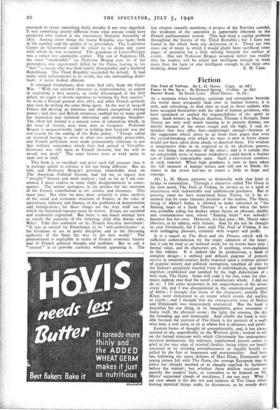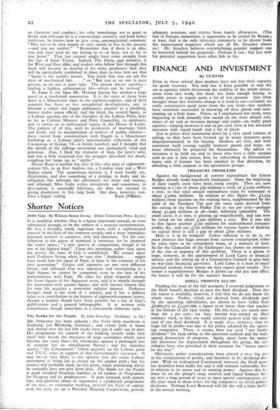Fiction
AT a moment when brutality, cynicism and corruption bestride the world more arrogantly than ever in human history, it is well, and refreshing, to find time to read in those authors who have occupied themselves with the ideal of human goodness, who have examined or exalted the responsibilities of the spirit in man. Such writers as Marcus Aurelius, Thomas a Kempis, Saint Teresa are very well worth turning to in present dismay, not merely because of the sweet escape and the high, if sad, re- minders that they offer, but—surprisingly enough—because of the suggestion which arises to us from their pages that even the record-breaking evils which we stare at now in bitter shame would not have taken them aback, or daunted them. For wisdom is -imaginative alike in its sceptical as in its idealistic powers, the one being the dynainic of the other ; and it is certain that no conceivable news of human wickedness could knock a feather out of Castile's indomitable saint. Such a conviction comforts at each renewal. When high goodness is 'seen to have taken the full measure of human nature and still not to flinch, the sinner in the street inclnes to resort a little to hive and courage.
Mr. L. H. Myers presents us fictionally with that kind of bridge to consolation. Through a character called The Guru in his new novel, The Pool of Vishnu, he invites us to a spell of intercourse with indomitable and unblinkered goodness. But in passing, since we have mentioned Saint Teresa, let it be re- marked that by some fantastic decision of the author, The Guru, living in Akbar's India, is allowed to make reference to "the flaming heart of a Saint Theresa" at a date when the latter was probably riding her donkey about Spain, an obscure, shabby and contumacious nun, whose "flaming heart" was nobody's business but her own. However, let that pass ; Mr. Myers takes liberties, as he admits, with history. And let me not be thought to carp frivolously, for I have read The Pool of Vishnu, if not with unflagging pleasure, certainly with respect and profit.
It is a sequel to The Root and the Flower, which will be sufficient commendation for the many admirers of the latter ; but it can be read as an isolated work, for its events have only a formal value, and its characters are, if anything, over-explained in this volume It is indeed like its predecessor, a book of complex design ; a stylised and delicate pageant of princely society in sixteenth-century India imposed upon a realistic picture of popular misery and political corruption, troubled all over by the Indian's peculiarly worried form of individualism, and bound together, established and justified by the high didacticism of a holy man, The Guru. Some will read it for this some for that ; many, indeed, may find the novel a satisfactory Whole. I did not do so. I felt some monotony in the exquisiteness of the aristo- cratic life, and I was disappointed in the counterpoised portrait of Akbar ; I thought that many of the characters, notably Hari Khan, were elaborated to an extent which events did nothing to clarify ; and I thought that the retrogressive story of Mohan and Damayanii was wearisomely attenuated. But the book is beautiful, for one thing, in its imaginative, grave evocation of India itself, the physical scene ; the light, the seasons, the sky, the brooding age and immensity. And chiefly the book is valu- able because the portrait of The Guru is the portrait of a really wise man, a real saint, to sit at whose feet is pleasure and profit.
Eastern forms of thought sit uncomfortably, and, it has always seemed to me, unprofitably on the Western spirit ; trained to rely on the formal structure with which Christianity has underpinned mystical intimations, the ordinary, uninformed person comes to grief at the very edge of oriental ideality, being either too hastily attracted to its seeming amorphousness or equally hastily re- pelled by the. fear of bogusness and sentimentality. And here, too, following the many debates of Hari Khan, Damayanti and young prince Jali with The Guru, the average European may be either too cheaply soothed or as cheaply repelled by facileness before the eternal ; but whether these shallow reactions are entirely the readers' fault, or somewhat to be blamed on Mr. Myers' occasional clouds of wordiness, I am not sure. What I am sure about is the dry wit and wisdom of The Guru when, leaving mystical things aside, he discourses, as he mostly does., on character and conduct ; his salty mbralisings are as good as bread, and although he is a convincingly sensitive and kind father
confessor, he knows how to give crisp, uncomplicated comment.
"One has to be very simple or very saintly to live in the present —and you are neither." "Remember that if there is an elite,
you and your kind do not belong to it—at least, not as far as
you know." That last counsel might have come straight from the lips of Saint Teresa. Indeed, The Guru, gull moralist, is
for West and East alike, and readers who follow him through this book will become so trustful of his witty gentleness that they will be particularly comforted in these days to hear him say that "Spirit is the world's master. You know that you are not the slave of mechanical fate. . . ." or "But just as no one is pure person, so no one is pure type. The person always survives— leading a hidden, subterranean life—which can be revived."
In Fame Is the Spur Mr. Howard Spring has written a huge novel in a hard-tried convention. It is the story of three boys born in a Manchester slum in the eighteen-eighties, and of their separate but thore or less interplaited developments, one to become a vulgar and happy millionaire, another as a plodding, honest trades union official, and the third, the central figure, as a Labour agitator, one of the founders of the Labour Party, later to be, as Cabinet Minister and Privy Councillor, its destroyer, and to sweep on to well-earned repose in the House of Lords. The pattern of all this, with its incidentals of marriage, birth and death, and its manipulation of matters of public interest— these varied from conversations with Engels in a Manchester bookshop to a Labour peer's unremarkable reflections at the Coronation of George VI—is firmly handled, and I thought that the sketch of the suffrage movement was particularly vivid and generous. Also, I liked the character of Ann, the hero's wife, and was a little surprised that the wrapper described her death, coughing her lungs up, as "idyllic."
Hester Roon is another big slice of life—this time of eighteenth- century life, in an East Anglian inn, a London slum and a West Indian island. The eponymous heroine is, I need hardly say, illegitimate, and also something of a prodigy in looks and in- telligence, but although her adventures are many and various, and although Miss Lofts writes attractively and sometimes, in description, is unusually felicitous, she does not succeed in giving distinction to this long book. She does, however, con-































 Previous page
Previous page